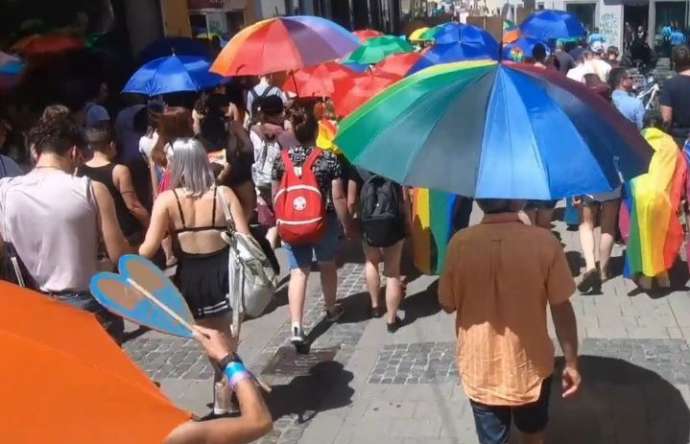STA, 20 June 2021 - The LGBTIQ+ community staged the Pride Parade in Ljubljana on Saturday afternoon under the slogan Resist the Oppression as a culmination of a week-long festival, demanding freedom, equality and unconditional respect for human rights of LGBTIQ+ persons. The annual parade was for the first time accompanied by the Balkan Trans Intersex March.
The rights the LGBTIQ+ community has acquired and perceived as unalienable are today again at stake, the Pride Parade Association, the event's organisers, said in a statement.
"Just like every year, we're fighting for our rights. But since we're witnessing a rise in hate and regression in what we've already achieved, it's now even more important to preserve what we've achieved," activist Katja Štefanec from the association told the STA.
The parade urged resistance against authoritative authorities and against the illiberalism of the incumbent government, which perceives as threat everything that is different, the organisers said.
The focus was also on the consequences the coronavirus epidemic and restrictions had for LGBTIQ+ persons, including rising homelessness and deteriorating mental health.
The Balkan Trans Intersex March meanwhile brought together members of the transgender, intersex and non-normative sexuality communities to march in Ljubljana's streets.
Held under the slogan With Love, the march addressed transphobia, interphobia, violence, lack of legal protection, violations of private rights and shortcomings in healthcare for the transgender, intersex and non-normative sexuality communities.
"Due to their sex change, transgender and intersex persons are faced with even more discrimination," the march's representative Edi Klobučar told the STA.
"There is an additional stigma in our country because of pathologisation, that is medicalisation. So the message of this year's parade is the need for access to healthcare, which has been additionally hindered due to the epidemic over the past year."
The march also called on the media to report on this community without additional stigmatisation.
Mayor Zoran Janković, addressing the parade as it arrived in Congress Square, said Ljubljana is a city that has always been and will remain open.
Simona Muršec, the association's president, said the past year had been hard, frustrating and hopeless for the entire LGBTIQ+ community, stressing that "the political measures to fight the epidemic pushed the bulk of our community into more poverty and more precariousness, back into the closet or even into homelessness."
She believes that after the epidemic, the LGBTIQ+ community will have to once again fight for its physical presence in society.
"In a society which does not have freedom, solidarity and dignity for all, there will soon be no freedom for anyone," stressed Matjaž Gruden, the head of the Council of Europe directorate for democratic participation, via video call.
The head of the European Commission Representation in Slovenia, Jerneja Jug Jerše, said the EU was striving to be a union of equality, pointing to its adoption of a strategy on LGBTIQ+ equality last year.
Since 12 June, the Pride Parade Festival has featured a number of events, such as exhibitions, workshops, discussions, and literary events.
The first Pride Parade in Ljubljana was organised in 2001.







